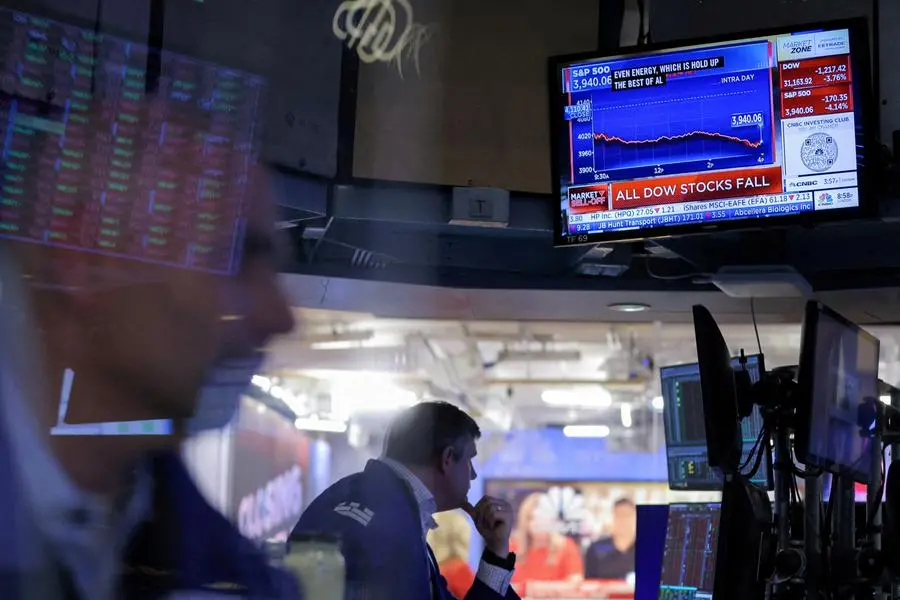PHOTO
NEW YORK: U.S. stocks closed mixed on Wednesday after the Federal Reserve left its key interest rate unchanged, as expected, and indicated that while its next move will likely be a rate cut, continued progress on inflation is not assured.
The S&P 500 and the Nasdaq ended lower while the Dow Jones Industrial Average notched a modest gain.
The Federal Open Markets Committee concluded its two-day monetary policy meeting with a unanimous decision to let the Fed funds target rate stand at 5.25%-5.50%.
The accompanying statement left the timing of any rate cut in doubt, and Fed officials underscored their concern that the first months of 2024 have done little to build the confidence they seek in falling inflation.
At the subsequent press conference, Fed Chair Jerome Powell suggested that while the central bank remains focused on bringing inflation back to its 2% target, he noted progress toward that goal and dismissed the notion of an imminent rate hike.
"Powell didn't rock the boat very much," said Ryan Detrick, chief market strategist at Carson Group in Omaha. "He acknowledged that inflation is still a problem but remained optimistic that it will improve over the coming quarters."
"What sparked today's rally was when he said the next move will not be a hike," Detrick added. "He pushed back against that, hard. ... That allowed the bulls to take charge."
Powell said the labor market was normalizing, citing data released on Wednesday showing job openings dropping to a three-year low.
First-quarter reporting season has breezed passed the halfway point, with 310 of the companies in the S&P 500 index having reported. Of those, 77% posted consensus-beating earnings, according to LSEG.
Analysts now expect aggregate first-quarter S&P 500 earnings growth of 6.6% year-on-year, a significant improvement over the 5.1% estimate as of April 1, LSEG data showed.
Among individual companies, Advanced Micro Devices shed 9.0% after its disappointing artificial intelligence chip sales forecast, while Super Micro Computer slid 14.0% following the company's quarterly revenue miss.
The weak results pulled the Philadelphia Semiconductor Index 3.5% lower.
Amazon.com rose 2.2% on better-than-expected quarterly results as interest in AI helped drive cloud-computing growth.
Johnson & Johnson advanced 4.6% after it said it will proceed with a proposed $6.48 billion lawsuit settlement over allegations that its baby powder and other talc products cause ovarian cancer.
Starbucks tumbled 15.9% after the coffee chain cut its sales forecast as it posted the first drop in same-store sales in nearly three years.
CVS Health plunged 16.8% after the healthcare company's earnings fell short of consensus and it slashed its annual profit forecast.
The Dow Jones Industrial Average rose 87.37 points, or 0.23%, to 37,903.29, the S&P 500 lost 17.3 points, or 0.34%, to 5,018.39 and the Nasdaq Composite dropped 52.34 points, or 0.33%, to 15,605.48.
Of the 11 major sectors in the S&P 500, energy shares recorded the largest percentage loss, while utilities led the gainers.
Advancing issues outnumbered decliners on the NYSE by a 1.38-to-1 ratio; on Nasdaq, a 1.50-to-1 ratio favored advancers.
The S&P 500 posted 12 new 52-week highs and 10 new lows; the Nasdaq Composite recorded 55 new highs and 105 new lows.
Volume on U.S. exchanges was 12.26 billion shares, compared with the 11.08 billion average for the full session over the last 20 trading days.
(Reporting by Stephen Culp; Additional reporting by Shristi Achar A and Shashwat Chauhan in Bengaluru; Editing by Richard Chang)




















